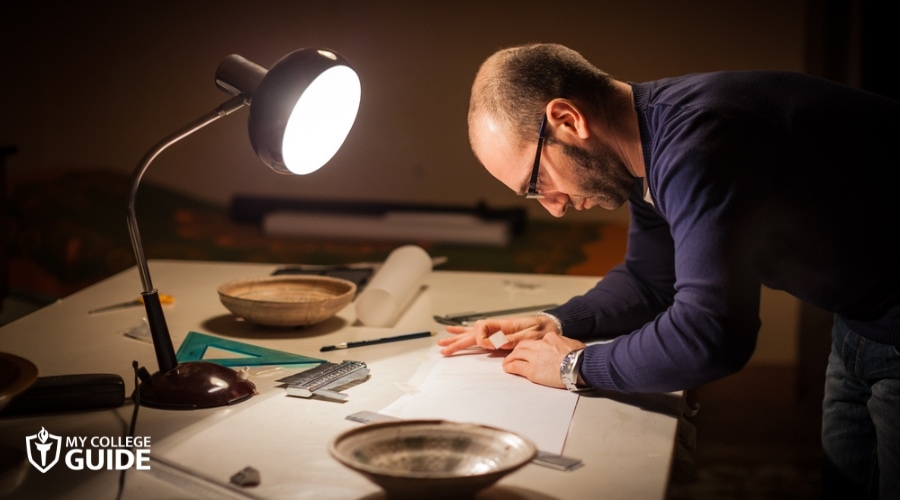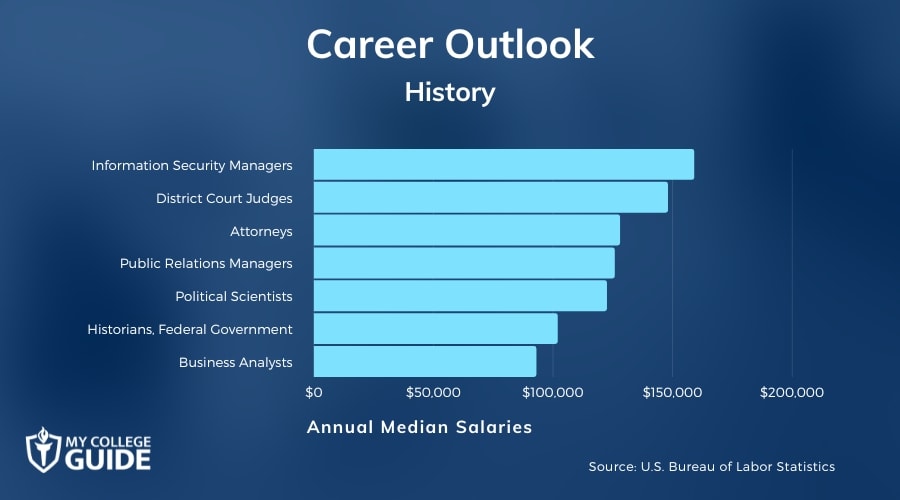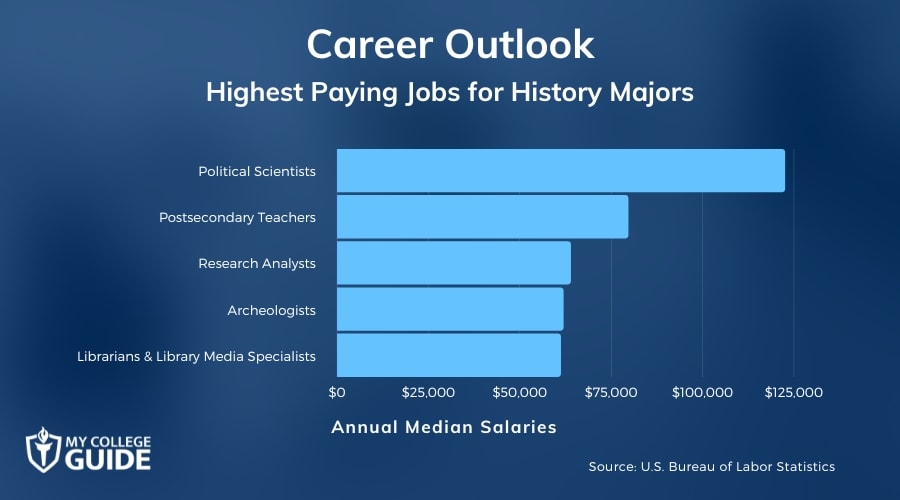If you enjoy learning about events and people of the past, you may want to consider looking into the various history careers available.

For a versatile degree program, a history degree could be a great way to build a long-term career.
Editorial Listing ShortCode:
With a degree in history, you will be able to apply your knowledge and skills to a variety of career fields that include business, law, and government work.
What Can You Do With a History Degree?

History is an extremely diverse field. Whether you are interested in preservation and museum work or you want to utilize your skills in the modern corporate world, there are many options available for you to work in fulfilling job roles.
With a history degree, you can choose to work with the creative side of history curating museum exhibits or researching various subjects’ history. Perhaps you’d prefer to take your degree in a different direction and use your knowledge to become a lawyer or paralegal. Graduates with a history degree can also opt to become a journalist or writer.
Editorial Listing ShortCode:
If you have a passion for all things history and are wondering what can you do with a degree in history, you could also become a history teacher in various subjects like US History or Global History.
10 Things You Can Do with a Degree in History
If you’re considering a degree in history, you might be wondering about different careers or types of history major jobs.
As you’ll see, there are many options for satisfying careers you can explore. Based on data from the U.S. Bureau of Labor Statistics (BLS), the median salary for someone with a history degree is $60,000. Listed below are 10 history professions you can pursue with a history degree.
1. History Professor

Becoming a history professor is one way to share your love of history with others while advancing your knowledge through research.
History professors at the university level usually teach in lectures or small groups while conducting research and potentially publishing their work. History professors shape how we see past events and periods of history and how we can use this knowledge to help shape a better future.
2. Journalist

While journalism may not seem like an obvious career for a history major, many of the necessary skills overlap. Journalists are not only up to date on current events, but they also need to research and analyze issues and understand the background and history.
Journalists can find work through online and print publications, magazines, newspapers, TV networks, and numerous freelancing opportunities.
3. Archivist

Becoming an archivist is one way to be hands-on with history. Archivists can assess the value and validity of artifacts and documents in various settings, including museums.
Archivists help organize and preserve an institution’s artifacts and curate collections for public displays. Archivists frequently work at museums but are also employed by universities, governments, hospitals, libraries, and private companies.
4. Historian

Becoming a historian is one of the history major careers that allow you to immerse yourself in history. They study the past through historical documents, photographs, and artifacts.
Historians have strong analytical and research skills, studying a time period, event, or historical location and publishing their findings. Historians may find employment through universities, non-profit organizations, private companies, historical associations, or government agencies.
5. Lawyer

Lawyers need the strong analysis, reasoning, and critical thinking skills that many history majors develop. Regardless of the type of law you may practice, all lawyers must be able to research and analyze historical cases, the history and development of individual laws, and legal precedents.
There are numerous settings you may find employment as a lawyer. Lawyers will always be in demand, from large and small law firms to government agencies.
6. Genealogist

Genealogists work with people to learn more about their family background. This work can include tracing a family’s lineage and creating a picture of their past.
You can piece together a family tree for generations by using birth certificates, government census data, obituaries, court records, printed publications, and other historical documentation. Genealogists can work as private consultants and may find employment through universities, libraries, companies, and government institutions.
7. Librarian

Librarians have an essential job in organizing, classifying, and curating information and databases and also as a resource in helping others find the information they need.
Becoming a librarian requires the research, organization, analysis, and communication skills that are developed when earning a history degree. Numerous sectors employ librarians, including education, law, business, government, and public and private institutions.
8. Writer and Editor

Many history majors graduate with extensive writing and editing experience, which can naturally lead to careers in writing or editing. You may have the opportunity to write about or edit for publications focused on history topics, or you may be able to use your research and findings and publish your own material.
Opportunities in copywriting, marketing, editing, publishing, and freelance work are just a few options available to graduates with these skills.
9. Political Scientist

Choosing a career in political science allows you to focus on studying governments, from their origins to current events and contemporary government challenges.
Political scientists also help use our understanding of governments to help provide solutions to current challenges facing political systems today. Political scientists may find employment teaching in universities and consulting in government agencies and private companies.
10. Paralegal

The research, analysis, organization, and critical thinking skills needed by paralegals can make this a natural career fit for history majors.
Paralegals provide essential support through fact-checking, documenting and organizing, researching, preparing legal documents, and many other jobs requiring a keen eye for detail. Paralegals may find employment in law offices, government agencies, and the legal department of many corporations.
As you can see, the skills you gain and use while earning a history degree can prepare you for a wide range of career opportunities after graduation.
Online History Degrees

Depending on your education and career goals, there are several types of history degrees that you may look into as you consider getting a history degree online.
- Associate’s in History: Can provide the fundamental analysis, writing, and communication skills needed in positions such as administrative or teaching assistants.
- Bachelor’s in History: In addition to analysis and writing, students gain the research skills needed for immersive history jobs like museum educators or history teachers.
- Master’s in History: After honing their writing and analysis skills, graduates may expand their career options to include museum curators and history professors.
- Doctorate in History: Requires completion of coursework in a specialized field, including a dissertation, with many graduates pursuing careers at universities.
Pursuing a degree in history can provide satisfying career options with every type of degree, with options to continue your education throughout your career.
History Careers & Salaries

If you’re wondering what can I do with a history degree, there are many career ideas that benefit from professionals with a background in historical events. By using knowledge from the past, those with a history degree are able to apply their skills to help influence the future of our society.
In the table below we have put together a list of the top 40 history careers & salaries and their median annual salaries according to the U.S. Bureau of Labor Statistics (BLS) to give you an idea of the options that are available.
| Careers | Annual Median Salaries |
| Information Security Managers | $159,010 |
| District Court Judges | $148,030 |
| Attorneys | $127,990 |
| Public Relations Managers | $125,780 |
| Political Scientists | $122,510 |
| Historians, Federal Government | $101,910 |
| Business Analysts | $93,000 |
| Geographers | $85,220 |
| American History Professors | $78,130 |
| Technical Writers | $78,060 |
| Library and Information Technology Instructors | $77,100 |
| Writers and Authors | $69,510 |
| Anthropologists, Engineering Services | $64,650 |
| Historians | $63,940 |
| Market Research Analysts | $63,920 |
| Editors | $63,350 |
| Stock Brokers | $62,910 |
| Lobbyists | $62,800 |
| Librarians, Colleges, Universities, and Professional Schools | $62,550 |
| Anthropologists and Archeologists | $61,910 |
| High School History Teachers | $61,820 |
| Librarians, Elementary and Secondary Schools | $61,640 |
| Librarians | $61,190 |
| Campaign Fundraisers | $60,660 |
| Curators | $60,110 |
| Archivists | $60,050 |
| Paralegals | $56,230 |
| Archivists, Government | $53,210 |
| Historians, State Government | $51,460 |
| Library Media Specialists, Information | $50,340 |
| Historian Research Assistants | $49,720 |
| Administrative Clerks | $48,550 |
| Journalists | $48,370 |
| Curators, Museums | $48,320 |
| Museum Exhibit Technicians | $47,630 |
| Photographers | $38,950 |
| Investigation Clerks | $37,900 |
| Legislators | $37,270 |
| Cataloging Library Technical Assistants | $36,970 |
| Library Clerks | $29,450 |
When choosing a college major, it is useful to have a general understanding of the career paths that you are interested in for the future.
By researching the history of career outlook, salaries, and job responsibilities of a variety of historical careers, you can then make an informed decision on what occupation best suits your long-term goals. The BLS estimates that careers as a historian will grow 4% over the next decade while curators and museum workers will see a 12% increase in new jobs within this timeframe.
When wondering what jobs can you get with a history degree, this field can open up a world of opportunity for students that have a passion for understanding the history of our world. Much like healthcare careers or careers in IT, depending on your particular field, you may make more or less than the numbers shown over the course of your career.
Naturally, if you continue your education to earn graduate degrees in research, business, or law, you have greater potential to earn top pay within your field.
How to Know if a Degree in History is Right for Me

As you consider if a history degree is right for you, it might be helpful to understand the common skills, traits, and characteristics that successful history graduates have in common.
One of the great things about a history degree is the versatility of career options you might pursue with your degree. That said, some common skills, traits, and interests are needed to succeed in this field.
Some skills and traits needed to be successful in history major careers might include:
- An interest in past and current events
- Thorough research ability
- Data collection and analysis
- Oral and written communication
- Critical thinking
- Academic writing
- Knowledge of a foreign language
- Reading comprehension
- Problem-solving
- Organization and administrative skills
If you are naturally curious about historical events, politics, and culture or frequently find yourself wanting to dig deeper into relevant topics, a history degree might be an ideal path for you.
History Licensure and Certifications

In addition to your history degree, there are several licenses and certifications you may pursue to expand your career opportunities.
- Teaching License: If you want to use your history degree to teach in a public school, you’ll need to meet your state’s teaching license requirements.
- Certified Genealogist (CG): Certified through the Board for Certification of Genealogists with a core research credential.
- Certified Genealogical Lecturer (CGL): Certified through the Board for Certification of Genealogists with an optional teaching credential.
In addition to licensures and certifications, there are also numerous professional history organizations you can join.
Is Financial Aid Available?

As you look into the different types of history degrees, consider that there may also be options for financial aid.
You may look into funding available through various state and federal loans and grants. While loans usually need to be repaid, grants typically do not. There may also be work-study programs that allow you to work part-time in order to help pay for your program. You may also explore financial assistance opportunities available through various public and private institutions.
You can visit the Federal Student Aid website to learn more about potential opportunities and begin by filling out the Free Application for Federal Student Aid (FAFSA).
What Is a History Degree?

A history degree is a degree program that prepares students for work in a variety of industries using historical research and knowledge.
Through the course of your degree program, you will delve into the economic, social, and religious past of cultures around the world. Those with a passion for history understand that by examining events from the past, they can apply this knowledge to create a better future for our world.
There are a number of different career paths that you can pursue after earning your history degree. Many history graduates choose to continue their education in order to work in the legal field or teach in a variety of school settings. If you want to jump right into the workforce, this degree will give you valuable skills that can be used in business, museum curation, and writing careers.
Throughout the course of your history degree program, you may be able to specialize within a concentration in order to gain in-depth knowledge that can help you with your chosen career path. These concentrations could include:
- European History
- Language
- Teaching and Education
- American History
- Global History
For those that want to continue full-time employment while in school or have family obligations, several top universities now offer online history degrees to help you juggle your busy schedule. Through these programs, you will be able to work at your own pace while still earning a reputable history degree.
Should I Major in History?

History can be a great major if you’re naturally curious, enjoy researching and analyzing information, can express your thoughts well in writing, or want to develop these skills.
Earning a history degree can allow you to pursue job opportunities in a wide range of industries, providing a good amount of flexibility based on your career interests. Jobs in history tend to pay average to higher-than-average salaries, with job growth expected to continue in many careers.
You may take into account your skills, interests, career goals, and areas you’d like to learn more about as you consider whether this degree is right for you.
What Skills Do You Learn in History?

As a history major, you’ll learn many skills that will help you succeed in almost any career your choose. As you research, analyze, process, and relay information in writing, you’ll develop the ability to think critically about information and communicate it clearly and concisely.
Some of the main skills learned while earning a history degree may include:
- Critical thinking
- Problem-solving
- Research
- Communication
- Academic writing
In addition to general education requirements, many students can narrow down the focus of their courses to a specific area of history that interests them.
Where do History Majors Work?

One of the exciting things about careers with a history degree is the wide variety of options available to pursue. Frequently, graduates interested in education and research seek employment in universities and academia, where they can teach and research.
Professionals interested in research, documentation, and the law may find employment as paralegals or lawyers in law offices, corporate legal departments, or government agencies. Some graduates pursue opportunities that immerse them in history, working in museums or traveling to research and investigate historical documents and artifacts.
How Much Does a Historian Make?

How much historians make can vary based on various factors, including your degree level and where you live. Listed below are several careers and their annual median salaries, according to the BLS.
- Historians: $63,940
- Anthropologists and Archeologists: $61,910
- Archivists, Curators, Museum Workers: $50,120
Based on statistics from the BLS, employment for historians is expected to grow 4 percent over the next 10 years, about as fast as most other occupations.
What Are the Highest Paying Jobs for History Majors?

There is a wide range of history degree jobs, with some options being more lucrative than others. According to data from the BLS, here are some of the highest-paying history professions that you might pursue.
- Political Scientists: $122,510
- Postsecondary Teachers: $79,640
- Research Analysts: $63,920
- Archeologists: $61,910
- Librarians and Library Media Specialists: $61,190
Career opportunities will vary depending on many factors, including your location, degree level, and prior work experience.
What’s the Difference Between Social Studies vs. History?
Sometimes “social studies” and “history” are used interchangeably, but there are some key distinctions between the two subjects.
| Social Studies | History |
|
|
In the same way that biology is a type of science, history is a type of social studies.
Is a History Degree Worth It?

Yes, a history degree is worth it for many professionals. The skills that you gain while pursuing your history degree can open up a wide variety of career opportunities for you to pursue. Graduates with history degrees may become professionals in universities, law offices, government agencies, non-profit organizations, and museums, to name a few.
According to data from the BLS, history degree careers for graduates, such as historians and political scientists, are on the rise, with growth predicted to continue over the next 10 years. For example, historians are expected to see a 4% growth in the job market while political scientists are expected to see a 6% overall growth.
Getting Your History Degree Online

If you have a natural desire to dig into topics and think critically about issues and events beyond just a surface level, a degree in history might be for you.
A history degree can provide you with valuable professional skills, including researching, problem-solving, critical thinking, communication, and academic writing. With a variety of history degree levels to choose from and pursue, you can choose the path that best supports your education and career goals.
If you wish to pursue the opportunities that may be available with a history degree, you may look into history degrees online from accredited universities.
